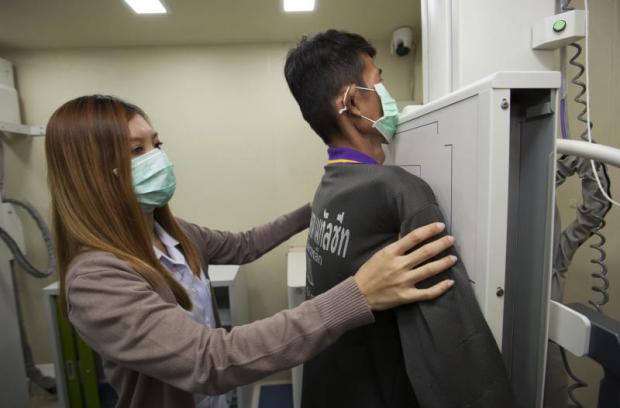
Thailand's noteworthy progress in combatting tuberculosis (TB), with a decline rate of around 10%, has given the world some hope.
In 2015, altogether 193 countries had promised to end the disease by 2030. However, the worldwide annual rate of TB decline, at 1.5%, has been much less than the required rate which is more than 10% by 2025 globally. But Thailand is among those that can achieve. The number of drug-resistant TB cases in Thailand also saw a 13% reduction in the past year.
"We try to bend the curves towards ending TB more sharply by implementing the WHO End TB Strategy. The National TB Programme of Thailand, Public Health Ministry, has come a long way in combating TB", said Public Health Minister Dr Piyasakol Sakolsatayadorn.
Concerted and well-coordinated multi-sectoral action coupled with a strong commitment from top political leadership has indeed made a difference in Thailand's fight against TB. This has resulted in the approval of the National TB Strategy in Thailand by the cabinet with additional funds to support TB case finding through latest molecular diagnostics and chest radiography, especially in high risk groups in prisoners.
The country has also developed the Thailand Operational Plan to End Tuberculosis 2017-2021 which is comprised of five strategies: active TB case finding to ensure full coverage through TB screening in high risk populations; reducing TB mortality; enhancing human resource capacity for TB prevention, treatment and control; creating a system to support sustainable and strategic TB management; and promoting research and innovation for TB prevention, treatment and control.
Keeping in mind the acute need of new molecular diagnostic tools for early detection of TB, new drugs to treat TB (including drug resistant TB), and eventually having a TB vaccine, the Thai government has also funded a national TB research network -- formally known as "ThaiTurn" -- that aims to bring innovative tools and strategies to bolster the country's response to end TB. In August 2017, ThaiTurn launched the country's first-ever national TB research roadmap, which includes research priorities targeted at addressing health systems challenges, as well as the prevention and treatment of multi-drug resistant TB (MDR-TB).
"This roadmap is a vital blueprint for invigorating efforts to end TB in Thailand. Leveraging this prioritised research strategy, with all stakeholders engaged, is expected to produce strategic innovations for patient-centred TB prevention and care, bringing us one step closer to provide a promising solution for ending TB," said Dr Piyasakol.
The World Health Organization attaches importance to new tools that will help contribute to TB elimination goals. The new tools would include a point of care rapid diagnostic test to screen as well as to diagnose TB, a treatment combination of drugs that would cure TB in a short period, a better vaccine for TB and a better detection and treatment strategy for latent TB. These are the identified gaps where research and development (R&D) is needed. A roadmap that enables medical personnel to track progress and eventually end TB, is necessary.
However funding gap continues to slow down the fight against TB. Financing also becomes scarce for R&D into new TB diagnostics, drugs and vaccines. Countries like Thailand are tapping on innovative and domestic financing mechanisms to bridge this gap. Thailand's domestic financing for TB control went up by more than 200% between 2015 and 2017, setting an example for other high burden TB nations to up their national TB budgets.
"The funding gaps do not only occur with Thai national TB programme, but these gaps, especially in R&D, also still exist at the global level. However, we attempt to fill these gaps with the budget from the existing health service system. For other additional budget, it will be allocated by the priority issues such as monitoring of TB contacts, treatment of MDR-TB, and social support to improve treatment collaboration," said Dr Piyasakol.
The budget framework has been used on developing a national strategic, operational plan and estimating costs of activities by relevant parties -- for instance, the Justice Ministry in coordination with the Health Ministry for (TB screening and care for prisoners, and the National Health Security Office for treatments and laboratory tests.
Weak health security can reverse gains made in the fight against TB. Perhaps Thailand's progress in TB control has been helped by its Universal Health Coverage (UHC) model, which has received global attention. WHO has noted the outcomes for TB control depends on how good the country's health system is, while domestic investment for health system strengthening and support will pay dividends for TB control. The next United Nations High Level Meeting (UNHLM) in September will focus on UHC, with Thailand as co-facilitator, along with Hungary. It is themed "Universal Health Coverage: Moving Together to Build a Healthier World".
It's high time to end TB!
Shobha Shukla and Bobby Ramakant are members of Citizen News Service. The article is to mark World TB Day on March 24.